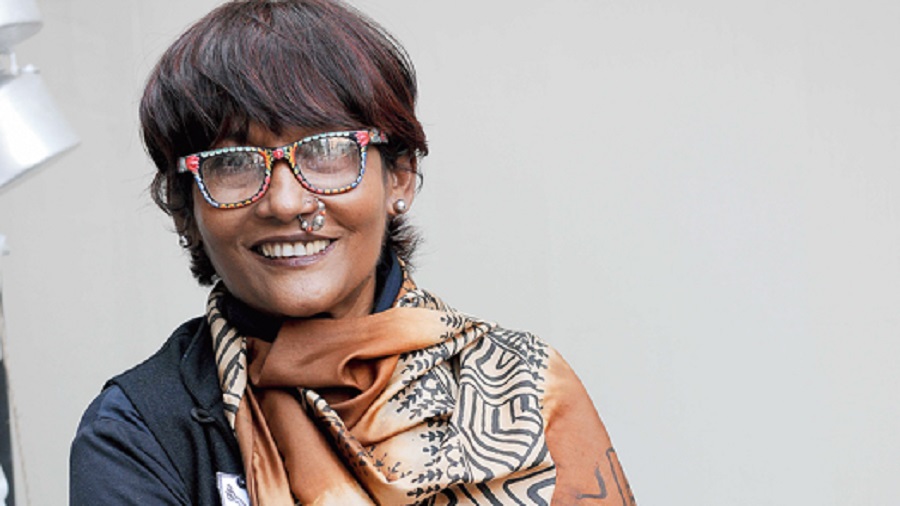Those who have interacted with Bibi Russell would know how difficult it is to get her on the phone. She is gone for months on end, working in the villages. Her source of sustenance. Her life force. This time, Bibidi, as we all lovingly address her, replied almost instantly. The model-turned-designer has been stuck at home and is prepping for a new challenge. Her online venture. The need of the hour.
Words like “difficult” and “challenging” crop up in the conversation often. And, then comes the optimism and resolve that define the intrepid designer who decided to support the weavers of Bangladesh right from her first collection and launched Fashion For Development in 1996, “built on the idea that fashion could facilitate social, economic and sustainable development”. We can almost visualise her bright smile and eyes that talk positive.
Yes, all will be well. A tete-e-tete.
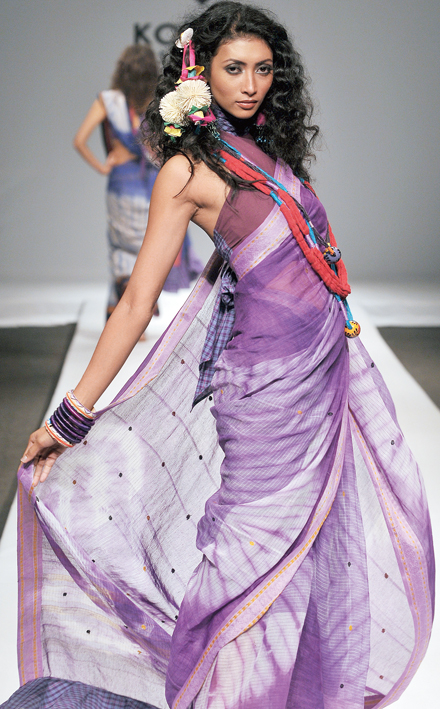
Pabitra Das and B. Halder
You have been putting out heart-wrenching posts on Instagram...
I never thought I would go through something like this. I am stuck at home for more than three-and-a-half months. I am always on phone and in touch with the weavers. The first thing I realised is that we have to change our way of work. Weavers and craftsmen all over the world don’t have the cash flow. They have spent all the money they had. That is a very big problem. Some of them called me from Rajasthan. Even weavers of Nadia and Phulia, I know, are going through a bad time, disaster. And, with kids at home, it is very sad.
Especially the weavers who makes saris, you have to make them understand that till the end of the year or till the middle of next year people are not going to buy. I don’t want them to be shocked. They think everything will be okay. We had no market on Poila Baisakh, like Bengal. Same for Id. Do you think there will be a market during Durga Puja? No! Maybe some, but not like before. They have to do something alternative and diversify.
I am a self-funded project. So, I closed down my shop (in Dhanmondi). I have to use every penny of my resources. I am going online. This is a very new experience for me. Everything has to go digital today. Everything has to be simplified and will be about slow and sustainable fashion which I have encouraged people to adopt in the last 20 years. I have to start from zero again but I am so excited.
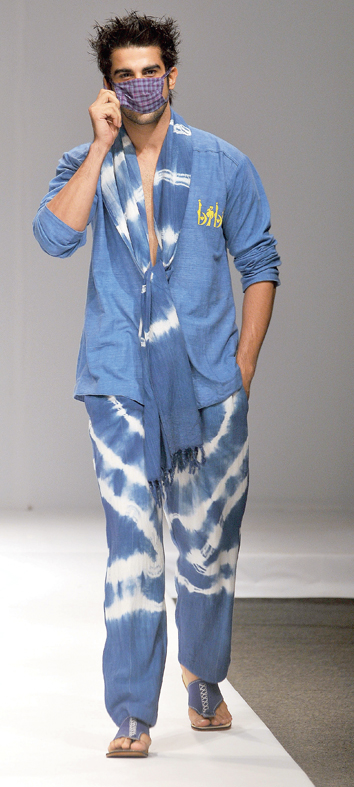
Pabitra Das and B. Halder
When I came back (to Bangladesh, in 1994, after her modelling years in London and Italy), I knew I was going to work with design and fashion, sustainable textiles, travelling to villages. Now I cannot go to the villages. I can’t see them. It is very difficult to make them understand because they are not online. You are talking to them.
I don’t understand when people say they are depressed. To be honest, I have been working for very long hours and now, may be I sleep for only two hours because this is a new chapter in my life but I will do everything to make sure that they have a market. This is going to be my time. I never even thought I have to do all this. I can’t sit at a computer and work. I have to touch. It is a very difficult time. We are in the 21st century and we have become inhuman. We didn’t care about nature. This is a big lesson for all of us that should be an eye-opener. We don’t know what is going to happen next.
Buying expensive things is going to be very difficult because you would want to wash it when you come back home. So, we have to think how to use these exquisite fabrics in a different way. Aami sharakhon chinta kori ki kore kora jabe. We have to go with things which are usable, washable and comfortable. I have never used anything synthetic. I am telling you there is hope.
What have you learnt about the online business till now?
You have to keep many things in mind. Simplify. Design. Quality. The size has to be perfect. I have to train my whole team as well as make the village people understand. I’ll have to be with them. I cannot give instructions sitting at a computer.
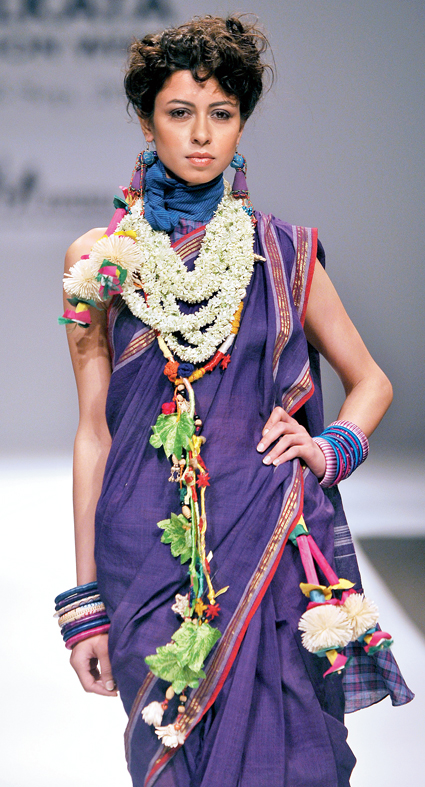
Pabitra Das and B. Halder
This morning I got a call. They said this was the first time they hadn’t seen my face for more than three months. The problem is you can’t go and meet them, which is sad.
My son works in Google. He told me long back ‘Ma, you should go online’. I had said then that I don’t want to. I am taking his help now.
What have you thought?
I am starting with gamchha (in the digital space). It is affordable and natural. I do organic, fine, natural gamchha. The colours don’t have chemicals and they will be multipurpose. Now you need to have a jhola bag which you can wash. I will do masks with organic cotton and they will be reasonable, not more than Rs 100. I will make everything affordable.
To revive gamchha weavers is my first thing. Even in India, you have gamchha. Cambodia, Sri Lanka and Vietnam also have gamchhas. Every weaver can make gamchha. All this is to sustain them. Of course I’ll have saris too, but I’ll go step by step. You need that cash flow. Whoever I work with, I’ll have to tell them that you need to pay 100 per cent advance. I think I will be online by the end of July or beginning of August.
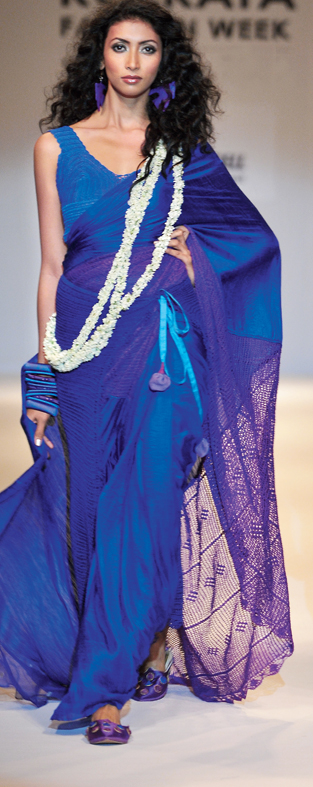
Pabitra Das and B. Halder
I have a long-term plan. I get many requests from all over the world. Look at our markets, all flooded with Chinese products. People are buying everything Chinese instead from their own people. You all should support the local.
Has production started?
I closed my shop and removed everything to my office. I own that; my father gave me. It is in the commercial area of Motijheel, but it’s close to old Dhaka and a part of my childhood was spent in old Dhaka. I went to school also. You have no idea how excited people are! I am reorganising my office. They are saying Bibi Russell will make this area famous. My clothes are affordable. I make ready-to-wear.
People who work with me don’t come from privileged families. They have been my biggest support. We make clothing in-house and do not hire people. So, I have a lot of responsibilities. I am not earning anything but I have been paying all these people. I will keep paying and retain them. They are a part of my life.
How difficult was it to close down your store?
When I decide something, I do it, but it was very sad. Whoever has come to my shop has been struck by positivity. Every bit of it was Bangladeshi and handmade. We had done up the store so beautifully. We didn’t have an architect. It was, however, more important for me to save people’s lives. I couldn’t have done that if I was paying rent. I will do everything to promote crafts. I would tell you to please support Nadia and Phulia.
What has this chapter taught you?
From my childhood, I didn’t know I could stay at home for so long. Jokhon school-e jetam, bari ashtam, douratam, naach shiktam, gaan shiktam. I am stuck in my flat for more than three months. That made me realise many many things. People complain that I don’t go anywhere. Now, I have all the time but I cannot go anywhere. I get up in the morning and clean my own home. I am active.
I don’t think I have seen so many films ever. Aami ek jon ek jon ke dhore... Utpal Dutt, Uttam Kumar, Satyajit Ray movies... shesh korchhi. All Bengali films. Ritwik Ghatak is one of my favourites. I never had the time to revisit them. I am reading books and have organised myself. I have no time! The last thing I watched was Bulbbul. It wasn’t on my list. A friend suggested. From my list, I watched Meghe Dhaka Tara. Aamar onek pochhonder ekta chhobi. Also, I love Jalsaghar.

